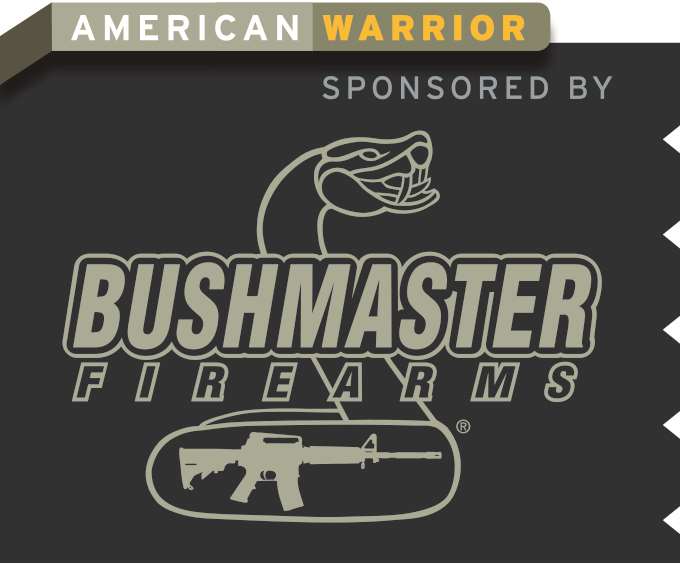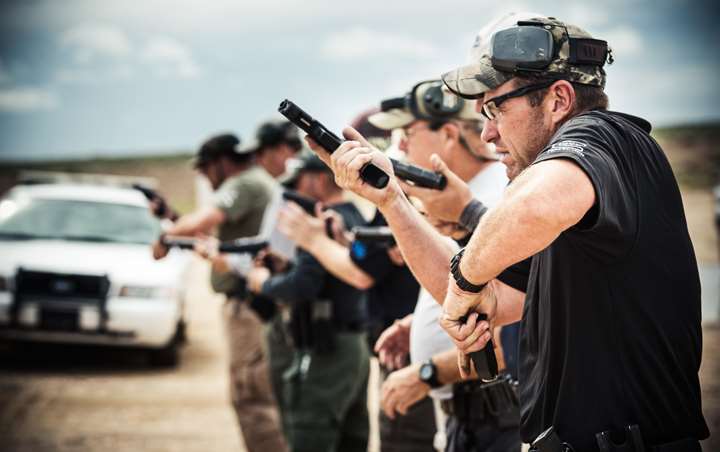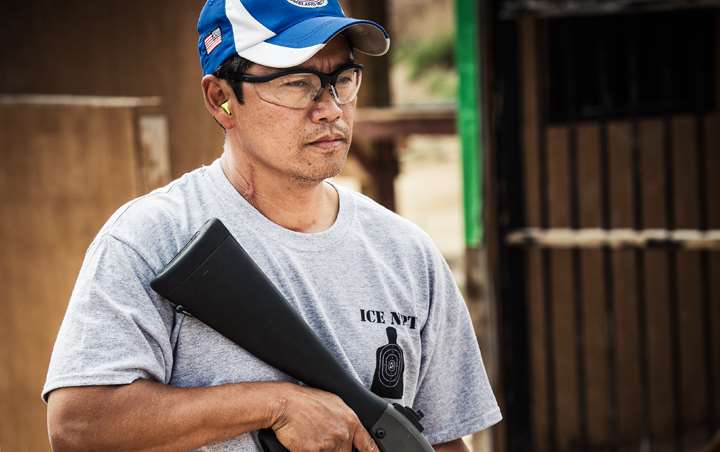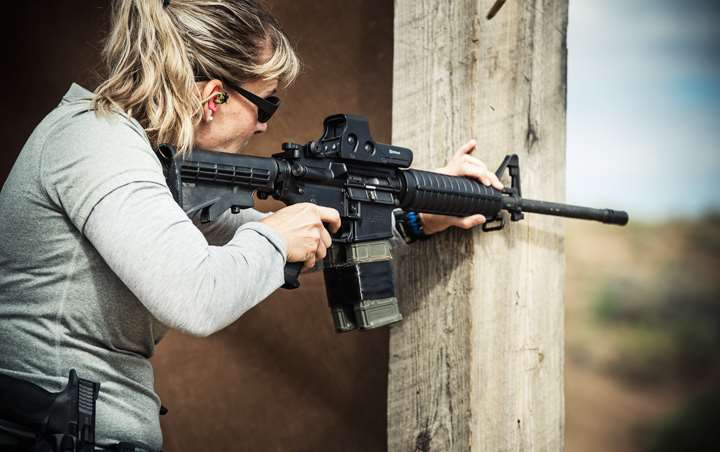
The NRA Law Enforcement Divison's Tactical Police Competition, held annually in Alburquerque, N.M., in conjunction with its National Police Shooting Championships, is touted as "competitive-based training to prepare you for the worst." Boy, is that ever accurate!"
Open only to law enforcement, military or private sector officers, the TPC is designed to encourage officers to gain more experience, training and time on the range using their duty firearms. While qualifying is a necessary standard of being in law enforcement, the NRA believes officers need additional practice time, live-fire exercises and other challenges to hone their skills and gain additional experience in handling and deploying duty firearms.
That’s where this competition comes in.
The TPC is different from other shooting matches in that all equipment and firearms used must be duty gear. Courses of fire fall into two groups—skill-based and
scenario-based courses. Skill-based courses challenge an officer’s skills and abilities in handling, accuracy and overall proficiency with a given firearm under a
specific set of conditions. Scenario-based courses place the officer in a hypothetical law enforcement situation where he or she must decide how to execute the course and overcome its challenges.
“I view it more as training,” said Sgt. Derrick Dutton of the Williamson County (Texas) Sheriff’s Department. “There is a competitive side to it, which increases the adrenaline, obviously. As anyone who has been involved in a firefight knows, your adrenaline is going to be pumping pretty bad.”
Sgt. Dutton had made the 11-hour drive with five others from his department to try their skills at the variety of challenges. The plan was to become proficient enough that when they do face a firefight situation, they’re more likely to walk away from it in one piece.
“In my opinion this is as close as you can get to a real gunfight without actually being shot at,” he said.
This year’s TPC featured six stations testing a wide variety of skills and proficiency with handguns, rifles, shotguns or a combination of firearms. Scenarios included officer down search-and-rescue, armed school intruders and bank robbery in progress. Each course was distinct, but all were designed to challenge each law enforcement officer’s skills with his or her duty firearms and equipment.
Some of these challenges include assessing threatening and nonthreatening targets, firing from unusual positions, making tactical decisions on the move, making use of cover, ammunition management, assessing hits and balancing the need for accuracy with speed.
Competitors from law enforcement agencies and police departments across the country were in attendance, as well as local military and even an international contingent from Venezuela.
The additional training, along with the competition, is appreciated by most in attendance.
“Competitive shooting is probably the closest thing you can get to put some stress on you as a shooter to see if you can handle it,” said Brian Buller of Customs and Border Protection’s Tucson field office. “I’ve had a couple of guys come with me over the years, and it blows their mind.”
A quick glance around at the competitors revealed that there was an enhanced health and fitness aspect necessary to competing in the TPC—shooting wasn’t the only challenge. On all six stages, shooters were required to run and move quickly through and around a variety of obstacles while operating their weapon systems.
For the most part it was clear that the competitors in attendance had physically prepared for the TPC and met the required fitness level.
“I try to hit the gym three or four days a week,” Fuller said. “Yes, it helps on the job, but it definitely helps your shooting. I dropped 35 pounds three years ago and kept it off, and I have just watched my shooting skyrocket.”
The fact that the range is held at 6,800 feet elevation doesn’t make things any easier—especially for those who come from closer to sea level.
“Generally speaking most cops are in fair shape,” said Los Angeles ICE officer Arlo Arcinas. “And this will tell you. It tells you what shape you’re in. You have to be honest with yourself. That timer—that little beep—is an adrenaline rush. People don’t really understand until they try it.
“You don’t have to be in phenomenal marathon shape. But you have to be in good to decent shape to do something like this.”
Officers who chose to compete on the second of the two-day match were in for a bit of surprise. Torrential downpours and flash flooding the night before turned many of the ranges into small ponds, forcing shooters to splash and wade their way from one target to the next, greatly raising the level of difficulty.
Among the second-day competitors was Catherine Gagnon of the San Antonio Police Department’s Bike Patrol unit. For Gagnon it was not only her first time shooting in a competition, it was her first time to use some of the weapon systems.
“I was really nervous. I hadn’t shot the shotgun before,” She told me immediately after completing a technically demanding stage that required the use of both shotgun and pistol. “I didn’t know a competition was a place to learn, but it is, and that’s pretty cool.”
Officer Kelly Earnest with the San Marcos (Texas) Police Department also competed on the second day. Kelly’s husband, Daniel Earnest, is a 15-year veteran of USPSA and 3-gun competition, but the TPC was only her second competition in 19 years as an officer.
Daniel Earnest came along not only to compete, but also to coach Kelly and Gagnon. As an experienced officer with San Antonio’s marksmanship unit, Daniel stressed the importance of the TPC for a younger officer like Gagnon. Unlike the standard range qualification, the TPC forces officers to think out of the box.
“The realism of what you would see on the street is here,” he said. “In some competitions, that thinking is not in there.”
While Gagnon lacked some of the firearms expertise of the other competitors, she certainly wasn’t lacking in physical fitness. In addition to being a bike officer, she spends her spare time doing CrossFit.
“I can deadlift large, drunk, completely passed out men into the wagon with no problems,” Gagnon said. “It’s good to have the guys say ‘I don’t worry about you having to pull me out of something.’”
And while she had no problems with the physical aspect of the TPC, Gagnon’s experience level with the different firearms became apparent on stage one—the blind stage. Without the distinguishable “clang” of the bolt slamming forward indicating the round was properly seated in the chamber, it was clear her rifle was not properly loaded. And without tapping the forward assist, she had unknowingly set herself up for failure.
As she entered the course and squeezed the trigger on the first target, she was met with a hollow “click.” In a panic, she pulled the charging handle to the rear and released it, double feeding. Eventually she dropped the magazine and cleared the malfunction, but not before losing precious seconds.
In a real-life scenario her mistake might have cost her dearly—possibly even her life. But at the TPC, it simply cost her time and points. And it taught her a lesson that could save lives in the future.
While Gagnon struggled with the stage, Fransisco Mijares, a police officer from Venezuela, called the blind stage, “the best stage I ever encountered in 30 years of competitive shooting.”
“The blind stage was amazing,” Mijares said. “It was real life.”
Despite the drastic differences in their abilities, both shooters gained valuable experience from the stage. In a nutshell, that’s exactly what the entire competition is about— officers gaining valuable experience in competition that they can use to be better at their jobs moving forward.
As the competitors learned, this year’s TPC definitely lived up to the slogan, “Competitive-based training to prepare you for the worst.” All the fun and fellowship was just an added bonus.


































